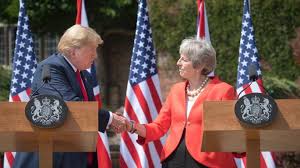Bruges Group Blog
Trump should prove his commitment to free trade with a UK-US Free Trade deal
There are several indicators that the US economy is doing very well at the moment. According to a recent BBC report:
"The US economy grew at its fastest pace in nearly four years in the second quarter, expanding at an annualised rate of 4.1%, official figures show.
The gains were driven by strong consumer spending and a surge in exports"[1]
In addition; there are positive signs on the US's jobs creation front. As reported by the NY Times:
"In all, the nation added 313,000 jobs in February, the most since July 2016, with impressive gains across low, middle and high wage industries."[2]
And as reported by Fox News:
"Under President Trump, black employment has grown by an average of nearly 40,000 each month. In January 2017, the black unemployment rate stood at 7.8 percent. It's now at 6.6 percent.
The number of black Americans with a job has risen by 708,000 from last year. Not only are black wages and incomes up since the election of Donald Trump, black employment has repeatedly hit historic highs."[3]
Despite these positive indicators there are still some warning signs for the US economy on the horizon.
A US-UK trade deal would help President Trump maintain the positive economic momentum.
Currently, 11% of the value of UK imports comes from the US.[4] An FTA could boost both US exports to the UK and vice versa.
A bond like no other
During a recent visit to Britain, President Trump spoke warmly of the UK-USA relationship "a bond that is like no other". He said:
"The United Kingdom and the United States are bound together by a common historic heritage, language and heroes."
And:
"I also want to thank Prime Minister May for pursuing fair and reciprocal trade with the United States.The United States looks forward to finalizing a great bilateral trade agreement with the United Kingdom.This is an incredible opportunity for our two countries, and we will seize it fully."[5]
This is not the first time that President Trump has promoted the idea of a UK-USA Free Trade deal.
During Great Britain's EU referendum debate, he condemned the then President Barack Obama's comment that the UK would be at the "back of the queue"[6] for a future Trade deal.
In an interview with Piers Morgan, President Trump said:
"It wouldn't make any difference to me whether they were in the EU or not. You'd certainly not be at the back of the queue, that I can tell you."[7]
However, despite all the warm words from President Trump over the past few years it might not be so simple for the UK and USA to sign an FTA.
This is because the US administration will be under tremendous pressure from its agricultural lobby to ensure beef and poultry are included in any future trade deal.[8]
Currently this sector faces huge barriers to entry to European markets because of the US's use of hormones, chemicals and antibiotics in meat production.
Speaking to Nick Robinson on the Today Programme, Environment Secretary Michael Gove MP put it bluntly:
"I made it perfectly clear, and indeed this is something on which all members of the government are agreed, that we are not going to dilute our high animal welfare standards or our high environmental standards in pursuit of any trade deal."[9]
So where do we go from here? Well, if I were advising President Trump, this is what I would advise: just sign a quick and basic Free Trade Agreement (FTA) that doesn't include much on agriculture, apart from a commitment to revisit the issue in future.
This would have several beneficial effects:
First, it would help cement the 'special relationship' if the USA were the first to sign an FTA with the newly independent UK.
Secondly, it would give US exporters preferential access to 66.5 million UK customers.
Thirdly, it would help the UK mitigate the short term economic turbulence of leaving the EU – especially important for the US, since the UK is one of only a few countries helping foot the bill for NATO.
As President Trump said recently:
"I want to thank you, Prime Minister, for the United Kingdom's contribution to our common defence.The UK is one of the handful of nations - 5 out of 29 - in addition to the United States, meeting the 2 percent GDP minimum defence spending commitment."
Finally, a free trade deal with the UK would be a strong signal to the global community that President Trump is indeed pro-free trade, and that the US was 'open for business'after his recent forays into Protectionism.
Yes, President Trump would need to silence his critics and deal with opprobrium from his own agricultural lobby.
However, he could mitigate this by outlining the benefits stated above, and by insisting to the American people that it was a great deal.
While such a basic FTA with the USA wouldn't necessarily have a huge impact on the UK economy, it would nevertheless be seen as a positive sign by those who wish to invest in the UK. The positive 'optics' surrounding the deal would undoubtedly help to steady our economy in the days following Brexit.
So there you have it, President Trump! You can either pursue a 'deep' FTA that may never materialize, or sign a more basic deal for a mutually beneficial 'quick win'. Remember the old maxim:"The perfect is the enemy of the good."
[1] https://www.bbc.co.uk/news/business-44979607
[2] https://www.nytimes.com/2018/03/09/business/economy/jobs-report.html
[3] http://www.foxnews.com/opinion/2018/08/20/trump-is-gaining-black-support-because-his-policies-are-improving-lives-all-americans.html
[4] https://fullfact.org/economy/uk-trade-usa/
[5] https://www.whitehouse.gov/briefings-statements/remarks-president-trump-prime-minister-may-united-kingdom-joint-press-conference/
[6] https://www.theguardian.com/politics/2016/apr/22/barack-obama-brexit-uk-back-of-queue-for-trade-talks
[7] https://www.theguardian.com/politics/2016/may/15/eu-referendum-donald-trump-brexit-uk-back-queue-us
[8] https://www.agri-pulse.com/articles/10766-us-has-plenty-to-gain-from-brexit-if-uk-is-willing-to-negotiate
[9] https://www.theguardian.com/politics/blog/live/2017/jul/26/gove-says-chlorinated-chicken-would-be-banned-under-any-uk-us-trade-deal-politics-live
Contact us
246 Linen Hall, 162-168 Regent Street
London W1B 5TB
Director : Robert Oulds MA, FRSA
Founder Chairman : Lord Harris of High Cross





